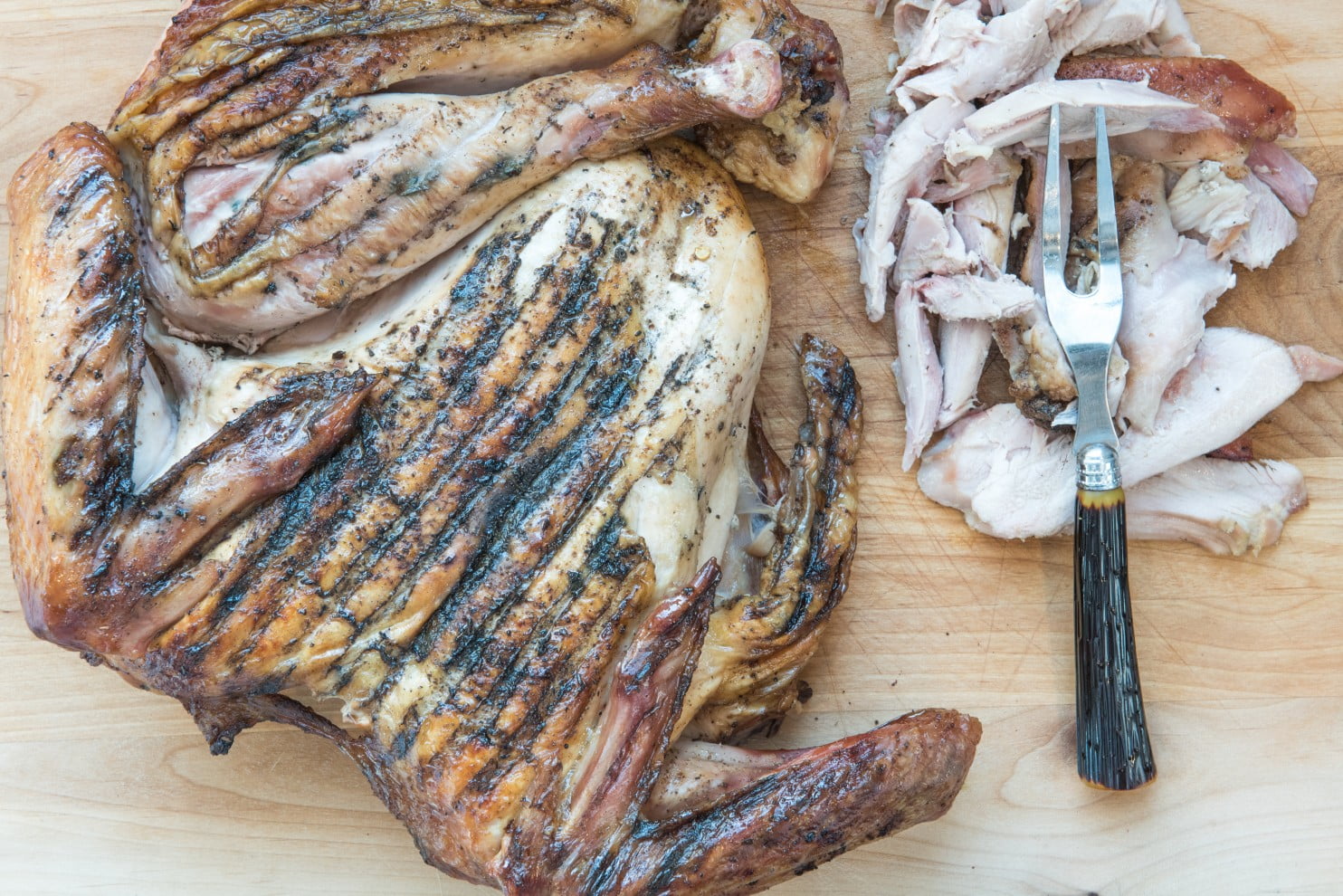

A year ago, I wrote a humorous piece about Thanksgiving based on a virally successful satirical guide to attending a predominantly black barbecue. I wanted to give readers of my blog a laugh while asking a serious question: Are the foods and other cultural traditions that mark African American Thanksgiving dinners just as different? “How to Survive Black Thanksgiving as a Non-Black Guest” was a hit because, much like the piece it was based on, it confronted, head on, ideas about the unspoken rules and understandings of our collective food culture.
[Make the recipe: Pit-Cooked-Style Turkey]
It made me realize that we lack a vocabulary that other ethnic groups have for the feelings and meanings behind, as one person put it, “how we be.” There should be, but there is no, African American version of Michael Pollan’s “Food Rules.” American ethnic groups have different versions of the same social slips, family politics and awkward moments — so that’s not unique. What is special is the approach to the foods of African American Thanksgiving meals and the ideas and history behind them.
[Thanksgiving Central: Your essential menu planner]
The collective West and Central African cultural past and slavery are key ingredients that spice and flavor the African American table like no other. It goes without saying that much of “white Southern” holiday food owes its savor to the influence of black cooks and living in the vicinity of black cultures. Thanksgiving, in fact, wasn’t even around during slavery; it was embraced by some black families during Reconstruction and beyond, and even then not everybody celebrated it, including the family of esteemed Southern cook Edna Lewis. Some of the foods we like to eat at the holiday are based on a repertoire established in antebellum times. Corn shucking and other harvest time celebrations — where turkey, hot wheat bread or rolls (absolutely rare during slavery), cakes and ham might be enjoyed — were generally held between October and November, and this was typically followed by hog-killing time and its promises of fresh offal.
The Southern groaning table and the shadow rhythms of the antebellum past were reflected in what I knew growing up in Maryland, starting with the stale corn bread dish known as kush that became corn bread dressing. The table rarely included just one kind of meat, and turkey and ham often vied for the position of favorite, while only the strong ate the chitterlings and pigs’ feet. But if I could get past the sight of those, there was always the hot, slightly sweet homemade rolls glistening with butter and softer than fresh cotton. Greens, never seasoned with vinegar by either of my Southern grandmothers, were kissed by the frost and therefore at their peak at this time of year, and this was also black-eyed pea and sweet potato time, and we could count on sweet potatoes making more than one appearance on the table.

Janice Canaday’s Potato Salad. (Dixie D. Vereen/For The Washington Post)
[Make the recipe: Janice Canaday’s Potato Salad]
While many of these dishes have links to the food world of slavery, some represent the glory of freedom, with deviled eggs and macaroni pie (the old Southern and Caribbean name for mac and cheese) being a prime example of the eggs, pasta and cheese that rarely if ever were enjoyed under the lash. Others, such as potato salad and peach cobbler, seem to be seasonally out of place, but they are well tuned to the communal spirit of African American foodways. Let’s face it, potato salad is a relatively cheap dish to multiply in case of extra company or a large crowd. The colorful, creamy, perfectly seasoned dish whose recipe caterer Janice Canaday, a historical interpreter in Williamsburg, Va., shared with me is one of the best I’ve ever had.
To Adrian Miller, author of “Soul Food: The Surprising Story of an American Cuisine, One Plate at a Time,” holiday food is inextricable from soul food, which he said “is essentially the celebration food of the rural South.” In a conversation over email, he described the process like this: African Americans who left the South during the Great Migration used food as a way to recreate a sense of home, and as they prospered, special occasion food became everyday food.
“This is a similar trajectory for the food story of most immigrant groups in the U.S.” Miller said. “In fact, what we often think of as ‘ethnic food’ is usually the celebration food of ‘the old country’ of that people.”
According to Miller, black holiday menus “usually have soulful (spicy, sweet, pungent, and well ‘larded’) side dishes, desserts and some sort of red or purple drink to accompany the more universal entree (ham, turkey, prime rib, etc.).” Pumpkin and sweet potato pies connect to the longtime British dessert carrot pie. He and I agree that sweet potato wins out over pumpkin at the African American table because of the long history of sweet potatoes in the community; before pies were popular, enslaved people ate them roasted whole, as a pone and in puddings. But sweet potato pie is never alone.
“Sweet is the flavor that means holiday soul to me because I can’t help but think of that extra table for the dessert spread: lemon ice box pie, sweet potato pie, coconut cake, poundcake and peach cobbler,” Miller said. “Mercy! But when people assail soul food as being unhealthy, I urge them to remember that celebration food was never meant to be eaten regularly.”
When I asked my social-media community on Facebook and Twitter what their African American families ate for their holiday meals, they responded with lengthy, warm memories that sparked others to remember their own family traditions. Black Carolinians such as Harold Conyers, scholar and proponent of traditional South Carolina barbecue, agree that turkey should be barbecued or should be paired with pork barbecue on the holiday table, while others insist on fried turkey (made popular by the late Chef Austin Leslie of New Orleans) and even fried chicken. Smoky, peppery, barbecued turkey is not a new invention; it’s right out of the barbecue past. Conyers’s recipe rejuvenates this tradition, a noted favorite of the late Harlem restaurateur Sylvia Woods. Regionalisms permeate soul traditions and help enrich the stories we tell about our food and our perspective on what constitutes edible soul.

Soul Food Mac and Cheese. (Deb Lindsey /For The Washington Post)
Folks from the “Creole Coast” and lower Mississippi Valley said that gumbo must be on the menu — whether it was turkey or based on the game or seafood of the season. In a community that now blends traditions or includes family from Caribbean and West African immigrant communities, oxtails and peas and rice, Jollof rice and curried goat have joined the more traditional repertoire, while other families have incorporated Latin American and Filipino dishes such as mofongo and adobo. People spoke fondly of corn bread dressing flavored with hard-boiled eggs or turkey necks, sausage or chicken giblets — and sometimes too much sage. It was agreed across the board that sweet potato pie is the only way to go, that peach cobbler must be present (even though it’s out of season) and must have a flaky, buttery crust, and that “Sock it To Me” cake (glazed yellow cake filled with pecans and cinnamon) as well as caramel cake should be at hand.
My friend KeKe Holiwell of Atlanta probably said it best in her response post: “Rutabagas . . . we always had rutabagas, slap-yo-mama mac-n-cheese, giblet gravy, yeast rolls, ‘conebread’ (not coRnbread) dressin’ with chunks of turkey in it, eggs, celery and it had a slightly green tinge because my grandma always added too much sage, sweet ’tatuh souflee, or sweet yams drowning in brown ‘shugah’ syrup and ‘buttah,’ corn puddin’, collards, black-eyed peas, fried turkey, glazed ham, potato salad, fresh green beans, potato casserole. . . . Pecan pie, ‘nanna puddin’, poundcake with lemon icing, sock-it-to-me cake, hummingbird cake, peach cobbler . . . Then I became a vegan. I have NO IDEA what in the world I will eat this holiday season.”
Of all the values that our food embodies — honoring our past, gratitude, recognizing our own cultural diversity, communal eating, hospitality — holiday soul food is also a way to remember people and embrace the love and nourishment their lives represent. No holiday is complete without my mother’s macaroni and cheese, with its savory hints of garlic, bite of sharp Cheddar and tinges of sweetness. I would always help Mom make the Thanksgiving meal, and being the official taste tester was one of my favorite things to do between washing collards and rubbing dried sage. Whenever I make this holiday treat, I can’t help but remember how our food brings us close to our ancestors.
While I pray for KeKe, give me some more barbecued turkey, potato salad and Mama’s macaroni and cheese. Amen, and pass the “to go” plates.
[Source:-Washington Post]





